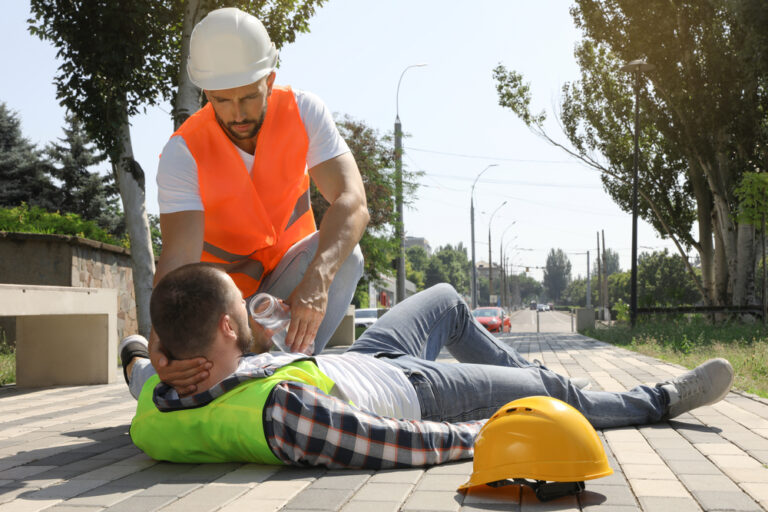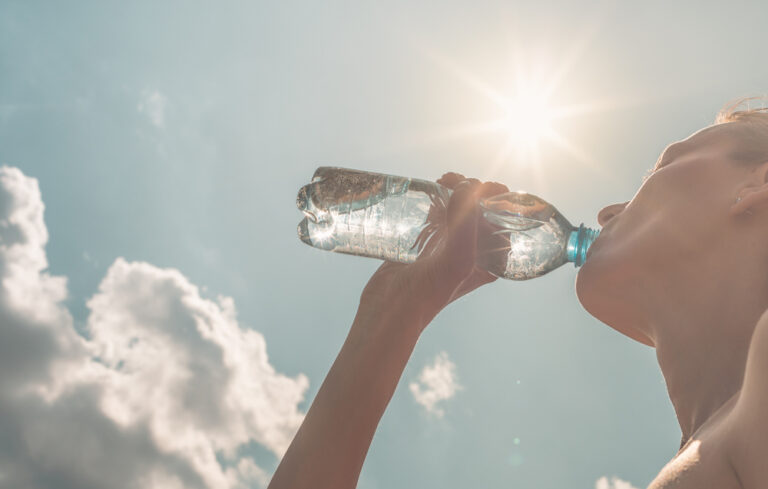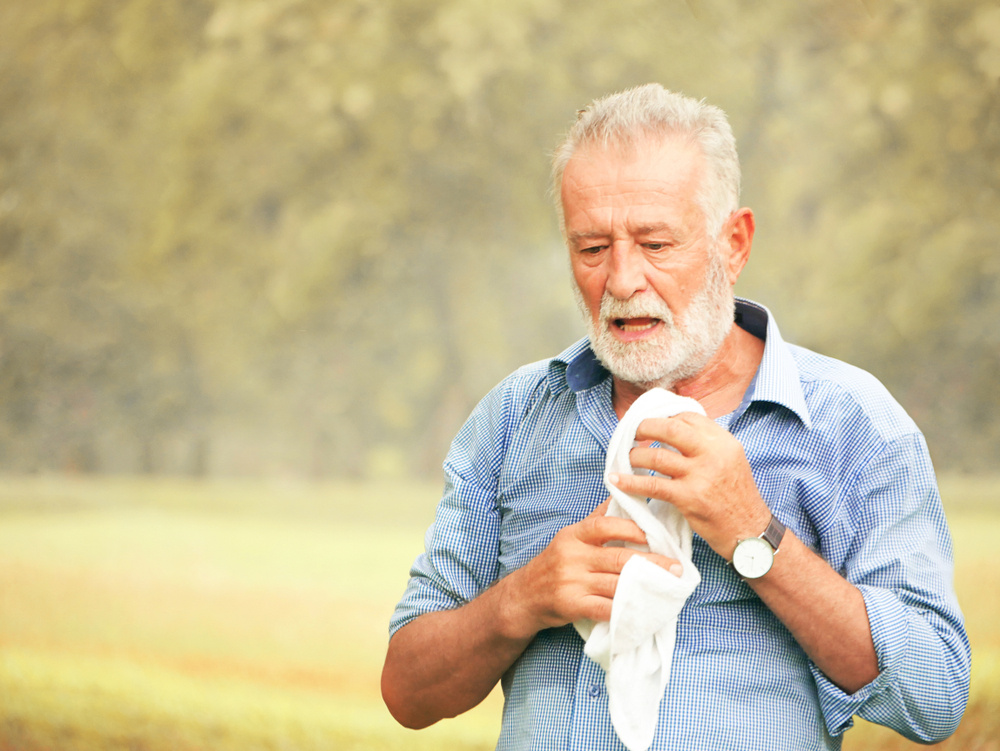Summertime is always a great time, but with the hot weather also comes the risk of heat stroke. Heat stroke can be a very serious medical emergency. In this blog post, we will discuss the causes and symptoms of heat stroke, as well as how to treat it and when to seek emergency care. Stay safe in the sun this summer!
Why is heatstroke an emergency?
Heatstroke occurs when the body is unable to cool itself, resulting in a dangerously high body temperature. With prolonged exposure to hot weather without proper hydration and cooling measures, the body’s natural cooling mechanisms can become overwhelmed.
The result is an extreme rise in body temperature. This can lead to dehydration, organ failure, seizures, coma, and even death.

What are the causes of heat stroke?
Heat stroke can be caused by a number of factors, including spending too much time in hot weather without adequate cooling measures, certain medications, or underlying medical conditions. Other factors, such as high humidity and lack of proper hydration can also contribute to heat stroke.
Heat Stroke Signs and Symptoms
The most common symptoms of heatstroke include dizziness, confusion, headache, blurry vision, shallow breathing, fast heart rate, dry skin with no sweat production (despite the hot weather), nausea, and even seizures or unconsciousness.
Other signs of heat stroke include:
- High body temperature
- Rapid heartbeat
- Rapid breathing
- Headache
- Oliguria (low urine output)
- Dizziness
- Nausea and vomiting
- Muscle cramps
- Confusion and disorientation
- Loss of consciousness
If you are experiencing any of these symptoms, it is important to seek medical attention from Aether Health – SilverLake ER immediately. They are open 24/7 for all medical emergencies in Pearland, Tx.
Heat Stroke Treatment
Treating heat stroke requires immediate medical attention. Emergency responders will monitor your vitals and provide cooling measures, such as ice packs or a cool bath to lower your body temperature. You may also try the following home remedies:
Move to a cool and shaded area
If you are outside when you start feeling symptoms of heat stroke, it is important to move to a cool, shaded area as soon as possible. This will help reduce your body temperature and minimize the risk of further damage.
Remove excess clothing and use cool water or ice packs to lower body temperature
Removing excess clothing and using cool water or ice packs can help reduce your body temperature. You can also spritz yourself with cool water to help keep your skin cool.
Drink fluids such as water
It is important to stay hydrated in hot weather, regardless if you are at risk for heat stroke or not.
Don’t drink sugary or alcoholic beverages to rehydrate
Avoid sugary and/or alcoholic beverages when trying to rehydrate. These drinks can actually interfere with the body’s cooling system and can make your symptoms worse. Stick to plain water, sports drinks, or electrolyte-rich fluids.
Monitor breathing and heart rate
Finally, it is important to monitor your breathing and heart rate. If these become rapid or irregular, seek emergency medical attention immediately.
In severe cases of heatstroke, you may need to be hospitalized for further treatment and monitoring.
When Should You See a doctor?
It is important to seek urgent medical attention if you or someone around you experiences symptoms of heat stroke. Heat stroke can be incredibly dangerous and should always be taken seriously. If left untreated, it can lead to serious medical complications, including organ failure and death.
Heat Stroke Complications
As mentioned, heat stroke can lead to a number of medical complications when it is left untreated. These include:
Vital Organ Damage
Heat stroke can cause damage to your vital organs, such as the heart, lungs, and kidneys. This damage can be permanent and potentially life-threatening.
Brain Damage
Brain damage is possible with severe heatstroke cases. Extreme temperatures can cause swelling of the brain which can lead to seizures, coma, and even death.
Muscle Damage
Muscle damage can also occur as a result of heat stroke due to extreme temperatures and dehydration. This damage can range from mild to severe, depending on the severity of your heatstroke.
Death
Finally, heat stroke can be fatal. It is important to take the proper precautions in hot weather and seek immediate medical attention if symptoms occur.
How to prevent heat stroke?

Heat stroke can be a very serious medical emergency and should always be taken seriously. Taking the proper precautions in hot weather can help prevent this dangerous condition.
Stay hydrated
Staying hydrated is key to preventing heat stroke. Make sure to drink plenty of water and electrolyte-rich fluids throughout the day, especially in hot weather.
Wear lightweight and breathable clothing
Wearing lightweight and breathable clothing can help your body temperature stay cool in hot weather. Choose light-colored clothing to reflect the sun’s rays and a hat to keep your head cool.
Take breaks from the heat in a cool and shaded area
If you are going to be outside for an extended period of time, take frequent breaks in a shaded or air-conditioned area.
Limit physical activity in hot weather
Try to limit physical activity in hot weather and take breaks when needed. Sweating too much can cause dehydration and increase your risk for heat stroke.
Avoid alcohol and caffeine
Alcohol and caffeine can interfere with your body’s cooling mechanisms, making you more vulnerable to heat stroke. Avoid these beverages when it’s hot outside.
Use sunscreen and wear a hat when outdoors
Use sunscreen and wear a hat when outdoors. This will help reduce your risk of sunburn and overheating.
Keep your house cool
It is important to keep your house cool in hot weather. Use fans to circulate air and open windows if possible. This will help keep your home temperature cool and prevent heat stroke.
Never leave anyone in a parked car
Finally, never leave anyone in a parked car in hot weather. This can be incredibly dangerous and can lead to heat stroke.
Who is at risk of a heat stroke?
Anyone can be at risk of a heat stroke, but there are certain groups who are more vulnerable. These include:
Infants and Young Children
Infants and young children have a higher risk of heat stroke due to their inability to regulate body temperature. Make sure to keep them hydrated in hot weather and never leave them alone in a car.
Elderly People
Elderly people are also more vulnerable to heat stroke due to age-related changes in their body’s ability to regulate temperature. Make sure they stay hydrated and out of the sun during hot weather if possible.
Those with Medical Conditions
People with certain medical conditions, such as heart disease and diabetes, are also more likely to suffer from heat stroke. If you have a pre-existing condition, be sure to take extra precautions in hot weather.
Take Note of Heat Stroke Symptoms and Treatment
In conclusion, it is important to understand the signs and symptoms of heat stroke and the best ways to prevent it. Taking the proper precautions in hot weather and recognizing the symptoms early can help reduce your risk of heat stroke and other serious medical complications. Always seek prompt medical attention if you suspect someone is suffering from a heat stroke.
If you need to learn more about the prevention or treatment of heat stroke, contact your doctor for more information. Stay safe in the heat!
Heat Stroke Emergency in Pearland, Tx
At Aether Health – SilverLake ER in Pearland, TX, we specialize in treating heat stroke emergencies and providing the highest level of care. Our dedicated team of physicians and nurses is experienced in caring for patients suffering from heat stroke. We provide 24/7 care to ensure that our patients get timely treatment and access to all the necessary resources during their stay with us.
If you or someone you know is experiencing signs of heat stroke, get help immediately. Our emergency room staff is standing by to assist patients suffering from heat stroke and any other medical emergencies. Don’t delay seeking help, contact us today for more information.




